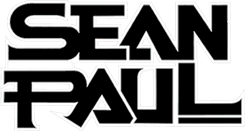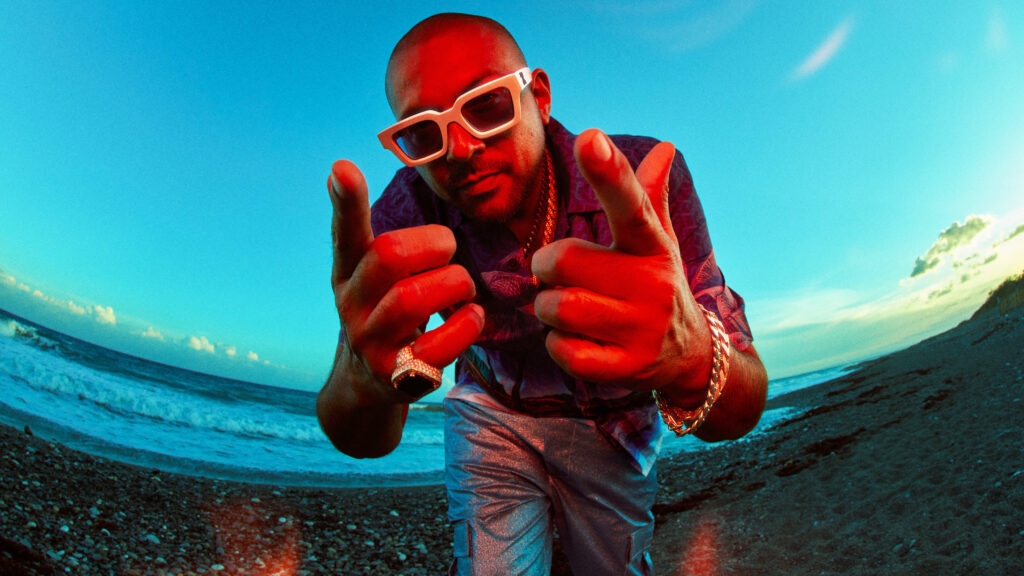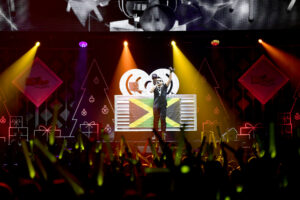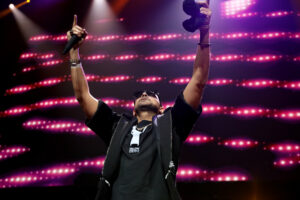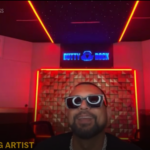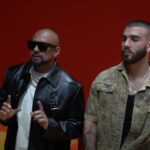The acclaimed reggae/dancehall artist talks about his new album “Scorcha,” smoking up with Rihanna in Jamaica, and clears up those wild Beyoncé rumors once and for all.
For elder millennials like me, Sean Paul will forever hold a special place in our hearts (feet?).
The Jamaican reggae/dancehall artist’s sophomore album Dutty Rock dropped my senior year of high school, and its infectious hits “Get Busy,” “Like Glue,” “Gimme the Light,” and “Baby Boy”—the latter with a little-known artist named Beyoncé—provided the soundtrack to house parties, spring break, prom, and our final summer before college. While my clubbing days are mostly behind me, Paul, who will turn 50 in January, is showing few signs of slowing down.
We’re huddled together in a van outside his Manhattan hotel, and Paul, despite coming off back-to-back club shows in Brooklyn, is talking excitedly about Scorcha, his eighth studio album out May 27. The LP boasts plenty of the catchy, dance-inducing tracks he’s known for—“How We Do It” (feat. Pia Mia) and “Calling On Me” (feat. Tove Lo) are just two examples—alongside slower, more ruminative ballads. For Paul, it marks a step forward in his evolution as an artist, with lyrics tackling weighty issues like family and infidelity.
One of the first things you notice upon meeting Paul is the giant crystal pendant. When I ask him about it, his eyes light up. As the story goes, he was in the middle of a backstage interview prior to a 2005 show in Sweden when all of a sudden, he felt a tap on his shoulder. It was none other than Lee “Scratch” Perry, the legendary reggae producer, sporting a wizard hat. Perry proceeded to place the hat on Paul’s head and proclaimed, “Sean Paul is the new reggae Merlin!” Then, he shoved a crystal in his hand. Paul now wears it around his neck as a good-luck charm, rubbing it occasionally over the course of our interview.
What do you feel sets Scorcha apart from your previous albums?
I make party music—something where people can forget about their problems and throw yourself into the party on a weekend—but this album shows a lot more growth as well. I’ve been a thoughtful person for many years, and it’s not been reflected in my music, so there are some songs like “Good Day” and “Calling on Me”—that’s a song about being there for each other, about family. “Borrowed Time” is a party track, but there’s something deeper in there. It’s talking about cheating. I came to the realization in that song that it’s not satisfying, that shit.
So that’s a biographical song about cheating?
I guess over years and years, yeah. But there’s also stuff put in there.
The beat on “Earthquake” is very catchy.
“Earthquake” is dope. I always want to keep that. I entered the music industry as Mr. Party Guy, and I freakin’ love it. It does well on stage when you perform stuff like that, so that’s a banger. The album was recorded a little bit before, during, and after the pandemic.
It’s a good time for it given that it’s coming out in late May and a lot of people seem to be ready to go out and dance again.
It feels good. I told myself when [the pandemic] started that it’d be two years that I’d plan for, and then when the two years crept up, I was scared, like “Do I really want to go back on the road?” I live in Jamaica—in Kingston—and for five months, I didn’t do nothing. I just stayed in my house. My mom was like, “You’re not even going to go to the supermarket?” Nothing. I was smoking on the back porch looking out and thinking, “What the hell is this world coming to?” I have asthma, so it was really scary. As time went on and I did more research, I felt a little more comfortable. Then I’d get up every day, do swim training at 9 a.m., and then go to the studio by 11 a.m.
You come from a prolific family of swimmers—and were a talented water polo player, right?
Yeah. My mom and my pops used to teach swimming in the summer. I swam, and I try to do it when I have the time. I wanted to go to the Olympics. My coach, his name was Andrew Phillips, and he went to the ’84 Olympics, so I wanted to go. He used to be coached by my mom when he was younger. But that was my dream from 14, 15 years old until about 19, and then I started to realize that my time wasn’t getting any faster. I swam very good for a Jamaican—I was top three every time in my races—but doing stuff abroad, it showed me how far behind I actually was.
How did you transition from being in the pool to making music for the club?
It’s funny. When you train in any kind of aerobic activity, you hear music in your head. I’d hear songs in my head, and I’ve always loved music. At age 15, I thought I’d be a producer. I pressured my mom to buy me a broken keyboard that I saw, and she bought that for me in hopes that I would take piano lessons. But I stopped going to piano lessons. I wanted to play what I heard in my head. At age 17, I started rhyming and decided that I wanted to be an artist instead. I wanted to be a conscious artist who made people think. My focus changed once I did a party song—or a “girls’ song,” as we call it—and it blew up. It was called “Baby Girl.” It’s not on any album, but I was riffing on “99 Red Balloons.”
I read that you went to a Jewish school in Jamaica. How did that happen, and what was it like?
Hillel Academy. It’s funny. I would say it’s an upscale school, and they didn’t enforce Jewish laws, or you didn’t have to be a Jewish person to go to the school—even though you did get off on Jewish holidays, so everybody was like “Yom Kippur!” and everybody else was like, “That’s not fair!” It was a real melting pot for me. It was like “it’s a small world after all.”
You’ve had some incredible collaborations. Do you have favorites—and least favorites?
[Laughs] I won’t mention the not-favorite ones, but I do have those. Some of my favorites… I would say Busta Rhymes, because I looked up to him, and to be able to do two songs with him—“Gimme the Light” and “Make It Clap (Remix)”—he had Jamaican roots, and I just felt like I was entering into a bigger club musically. Rihanna was another favorite. At the time, if I was doing a collab with anybody, I would always have to go to where they are, but with Rihanna, I met her on tour and she was like, “Yo, I love Kingston. I want to go to Jamaica.” So, she came, and the first place she wanted to go was the Bob Marley Museum. She went there and soaked it all in.
You got to give Rihanna a tour of Jamaica. That is awesome.
Yah mon. Beach, club, studio. She stayed there for like five days. That was very memorable, because I never got to show anybody in the biz how we do it at home. That just felt special to me. That song [“Break It Off”] It went to No. 7 on the Billboard even though no label pushed it.
OK but what was the actual highlight of giving Rihanna a tour of Jamaica?
Smoking on the beach, mon! We have a cay called Lime Cay, so my friend has a boat, and he took us out there. It was good! The waves were choppy, and you know I had to get the jet ski going.
One of your most memorable collaborations was “Baby Boy” with Beyoncé. I read that she was a big fan of yours and started attending a bunch of your shows at that time.
She had a few hits with Destiny’s Child, and they would do the Caribbean, but we didn’t really hang out. I’d always admired her music and she’s beautiful. So, when I heard Beyoncé was stepping out on her own and wanted me to do a single, I was like “Hell fucking yeah.” I thought it was going to be R&B, but it ended up being dancehall, so that made me go off. That was a bangin’ track, mon.
“I’d always admired her music and she’s beautiful. So, when I heard Beyoncé was stepping out on her own and wanted me to do a single, I was like, “Hell fucking yeah.”
It also made you the subject of a very big internet rumor that you and Beyoncé were seeing each other.
We had to have a speak about it.
Really?
Yeah. So, we only performed the song three times together—ever.
That’s not a lot.
Exactly. It was huge. It was nine weeks at No. 1, all over MTV and BET, magazines, everywhere. I had some people who were working with me for years and they were like “Boss—I’m now a fan of yours.” I was like “Now?!” But we had just three performances, and one was at Reggae Sumfest. At the time, we were both on the Rock the Mic Tour. This was 2003. She wasn’t on it every day, but she would come on certain dates and do the song [“Crazy in Love”] with Jay. One day, we left to do the video and then played Sumfest. That was the first time. The second time was in L.A., and a strange thing happened—and I think that’s what started the rumors. Strange things started to happen at the performances, which was weird. We went to L.A. and I did my show and then she was performing, and they told me to stick around because we’ll do “Baby Boy.” We do it and I run out there and the crowd goes wild, but after a while it seems like I lost their energy. And it’s weird because I was going wild out there. When the song finished, I came backstage and my own band was all pissed off, like “Man, that’s fucked up. You heard yourself? We couldn’t hear you in the crowd. Your mic was off.” I was like, “How the fuck did that happen?”
Do you think that was sabotage?
I didn’t think so then. But then when the thing happened in Scotland, that’s when we had the talk, because the rumors got really crazy. I landed in Scotland and it was this MTV event, and there were paparazzi everywhere. We ended up doing the rehearsal and everything was good, and the performance was going to be where I come up from under the stage, and then we both walk to a big center thing in the middle of the stadium which was surrounded by fire. That all happens, and then it reaches my part—“You’re a top, top, girl”—and the track keeps going, “Baby boy, you stay…” “Baby boy, you stay…” Just repeating. I was like, “What’s going on here!?” She was pissed and was like “I need to speak to you.” So, we go back and talk and she’s like “What’s all these rumors about?” and I’m like “Yo, I’m not saying shit,” and she’s like “These rumors fuck with my career. I just want you to know that.” I was like “They don’t fuck with mine. So, listen: I met Jay before you and we was friends, so me and him should talk. If he feels a way about that, then we should talk, because it’s not coming from me.”
So… do you think it was Jay fucking with the audio?
It couldn’t be because he wasn’t even there. But people started to say this shit. And there was one more performance we were supposed to do at the VMAs, and she said to me “We’re gonna have rehearsal, so look out.” The day before the VMAs happens, there’s this press day where you speak to every radio station, and I’m hearing somebody rehearsing “Baby Boy.” So, I’m like “What’s going on?” We went to the label and they were like “Yo…they’re not gonna do the song with you.” So, I’m sitting there in the crowd with my present wife and Paris Hilton is sitting in front of me. Beyoncé is coming down the stairs singing the song and Paris Hilton turns to me and goes “Why aren’t you up there?” It was embarrassing and weird. So, the next day, I was supposed to perform in Washington, D.C., and do the song with her for her father. I went there, did my show, and then waited around for a while. And I got pissed off. They were like “There are 3,000 influential people waiting out there for you to do it.” And I was like, “There were 50 million people watching the VMAs. I’m not doing it.” And I left. That was the last time we did the show, and by that time I was saying publicly that there was nothing going on. It fell on me. Nobody was asking them about it. But you know what? It was a big, fat, sexy song.
That was a pretty sexy music video—which may have helped fuel those rumors.
That was a piece of it, too. People in Jamaica were like “How come you’re not in any scene with her? You’re supposed to be grinding on her and shit.” That was an issue you reminded me of. I got there and thought we were going to be dancing, and the director called a meeting—which I never had before—and he told me exactly how things were going to go, and he said “You’re not going to be in any scene with her,” and I go,“OK.” He goes “You’re in a dream world and she’s thinking about you every night.” But…sexy video, sexy song, and a lot of sexy rumors.
“It’s weird…maybe it had something to do with her management at the time, which we found out later has been a tumultuous relationship for the both of them.”
Do you think these were Jay-Z’s machinations though? Because the rumor at the time was that Jay-Z personally got you cut from the VMAs.
I mean… he’s an icon. Even at that time, Roc-A-Wear was already worth $80 million. He was a very intuitive person, so he would have never been like, “I got to fight this like that.” You know?
Who do you think was doing it then?
That’s just how it is.
Just a coincidence that you were cut out of a bunch of performances and separated during the music video shoot?
It’s weird… maybe it had something to do with her management at the time, which we found out later has been a tumultuous relationship for the both of them.
So… you didn’t hook up with Beyoncé?
[Laughs] Nah! I wish I did! She’s beautiful.
Very early on in your career you cameoed in Belly—an iconic hip-hop film—and recorded “Top Shotter” with DMX for it. How did that happen?
DMX was the hugest artist in the world at the time. I’ll always respect that dude. R.I.P.
People forget that Hell Is Hot and Flesh of My Flesh came out the same year and both went straight to No. 1.
Two albums that sold over a million in one year, and then the following year he had another album that sold over a million. He was in movies, everything. I’ll always respect him for that because he wasn’t like, “Nah, I’m not doing the song. Who are these two kids?” He did it. Every year, there’s at least one or two stars that come out of Jamaica’s dancehall system, and that year it was me and Mr. Vegas. Hype Williams wanted to do it with two bigger artists, and Tony Kelly, the music producer, was like, “I think you should try these two hot kids.” So, it was Tony Kelly’s fault. Hype Williams loved it so much that he wanted to shoot a music video. So, we started shooting this music video in Jamaica, but time ran out for what he thought he was going to accomplish, so what ended up in the movie is part of the music video we shot. That ten seconds I’m in the movie really blew me up in hip-hop circles.
How do you feel about the way reggae has been treated? It’s always been set aside as its own genre and doesn’t get much play on traditional radio or crack the Hot 100 very often.
I have so much to say on that. We don’t have the numbers. There are 2.9 million people in Jamaica, so no matter how big we tell you this or that person is, nobody is buying or streaming that shit. Back when I was swimming for Jamaica, I would go to events in Trinidad, Mexico, Puerto Rico, the Bahamas, Orlando, and after we’d finish the competition we’d go out for a few beers and I’d hear dancehall music in the clubs—but never on the radio, it being the son of reggae. But it evolved.
These days, there are far more non-Jamaican artists doing dancehall music that get on the radio than Jamaican dancehall artists.
That’s the nail on the head right there. The music blew up and I had 10 successful years of being played on the radio in America. After that, it became harder and harder. I thought “Oh, I’ve got to blend my music with this dance music now just to get heard?” And then “Bailando” was a huge song, and I was involved in that, so I’m thinking “Why are these executives telling me ‘We’re not having fun trying to run your record in these places because people are saying dancehall is over with?’” So, I tried to do records with these other [pop artists], a lot of collabs. Then, I’m hearing Ed Sheeran, Rihanna, Drake, and Swae Lee on the radio, and I’m thinking, “This is all dancehall to me. Why are you categorizing me like that?” It’s been feeling that people are taking it away from us, because if you’re getting on the radio and you’re telling me dancehall’s not getting on the radio anymore…don’t tell me our stuff don’t work.
As you get older, is it tough to still be the dancehall guy? Does a part of you want to enter your “No Woman No Cry” phase?
[Laughs] There are times, for sure. Back in 2005, I was feeling that whole guitar vibe, so I did a song called “As Time Goes On.” I was hoping that song would take off, but it didn’t go anywhere except in France, so I sped things up with “Gimme the Light” after that and then “Temperature.” There are times in the show for things to slow down, because an hour and a half of smack, smack, smack can be a lot. My knees are talkin’ to me now, though, like “Yo, bro!” So, maybe I do need to pick up a guitar soon!
Source: The Daily Beast
